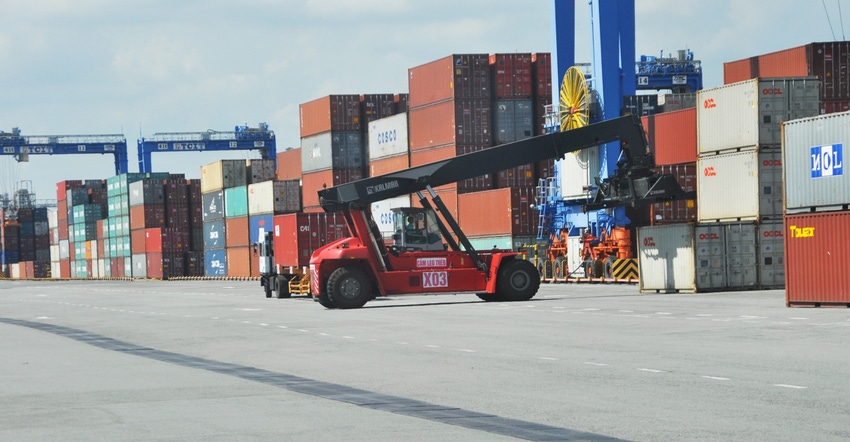
Karla Klingner is in a position to know the ins and outs of global trade. One thing she knows for certain is this: America’s farmers are not well-positioned for a trade war.
"America’s farmers are already operating on razor thin margins," Klingner says. "There are too many hands in the middle between the producer and the consumer and farmers need more control and more of a role in the markets. They are taking all the risk for a tiny slice of the reward."
Those factors could make the coming year very painful, Klingner says. But it could also offer an opportunity for a long-needed market corrector that will realign the chain of risk and reward in commodities.
As the founder and CEO of Palindromes, Inc., an international holding company with interests in agriculture, infrastructure and commodities, Klingner is passionate about her own family’s farm in Putnam County, Mo., and she is well aware that farmers were hurting long before talk of a trade war started.
"No farmer wants to see that Century Farm lost on his watch," she says. "But with the hard times that are coming in the next year or so, there are going to be farms lost. With neighbors also hurting for resources, I have a big concern that land that goes to auction won’t be sold to fellow farmers but will be bought by processors and bigger companies moving into land acquisition."
Klingner says other countries of the world, especially China, Russia and Ukraine, have better strategies in place to handle a trade war, and Brazil is gearing up to be the "winner" that supplies China’s appetite for soybeans.
"Where the U.S. has the best opportunity for gain is that our farmers produce higher quality soybeans and there is high demand for higher protein in the soybean meal," Klingner says. "Farmers who have substantial on-farm storage have a real opportunity to sit on their crop and wait for the demand for that quality to build."
The problem for many American farmers is that they are extremely short on cash. They have seen successive years of dipping into equity to put in the next crop, and they have to repay at least a portion of operating loans owed to the bank to gain new financing for next year’s production.
"What the U.S. needs to do is take a hard look at our ag system," Klingner says. "The trade war is exposing the weaknesses in our system. We need to provide better risk allocation and the markets need to truly drive price. Farmers who have higher quality grains should be getting paid healthy premiums for it in world trade."
Unfortunately, she says, the 2018 Farm Bill versions that have been passed in the House and Senate and are now moving toward conference debate do not address the fundamental problem.
"The big players in the middle — the grain companies and marketers, the processors — can play around four or five times with futures and the producer is stuck with the cash price they offer," Klingner says. "That puts the farmer in a bad position."
She says the short-term aid the Trump administration has promised to help farmers hurt by market losses won’t even begin to solve the problem.
"We have to revisit how we got to such thin margins in the first place and fix the inherent weaknesses in the market, including the fact that the only real incentives we have are for higher yield," she says. "We need to identify the quality demand and build in the rewards that give farmers a bigger share of the value of the production."
Klingner says living and working in China gave her a good perspective on the problem with doing business in that country.
"There are debt issues with China, and massive intellectual property issues," she says. "You can’t bank freely in China, you have to work through a joint venture. And it is very, very hard to get money out of China."
At the same time, there are immensely wealthy consumers in China, and they are growing in numbers and perfectly happy to pay high premiums for American products.
"There’s a 200% tariff on high-end things like Sephora cosmetics," she says. "Yet you can barely walk down the street through the crowds of consumers. I had a child in school in Shanghai, and I had every Chinese mother in that school asking me where I bought my food. There is a high level of trust in food from the U.S., and there will be a market in spite of tariffs."
Getting that reward back to American farmers will be the tricky part, Klingner says.
"The traders in the middle who are operating around the world are set," she says. "There are people in China who have seats on the Chicago Board of Trade. The people set up to suffer are their ordinary consumers and our farmers."
Klingner started her career working in ag policy on Capitol Hill as a legislative aide to then-Sen. Kit Bond, R-Mo. She helped work on the 2007 Farm Bill and the Water Resources Development Act, and then spent decades working overseas, primarily in China.
She served as president of GLS Management Group, a company that matches capital from investors in foreign countries, including China, with business ventures in the U.S. through the EB-5 program. She is a founding partner of the law firm Harbour Legal, and is an adviser for its immigration, agriculture, and international trade and commerce policies.
About the Author(s)
You May Also Like




